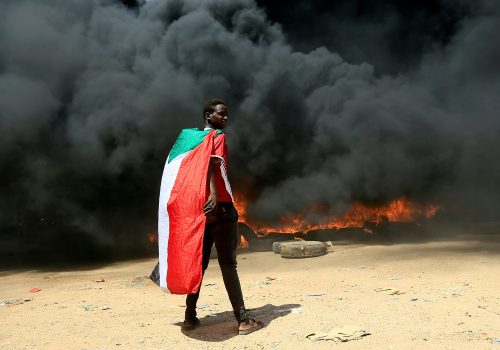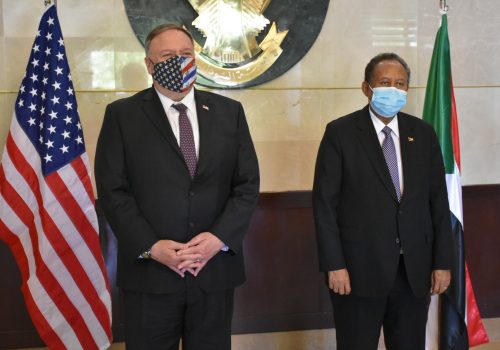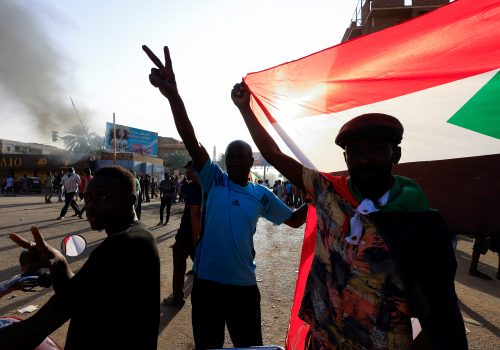Middle Eastern nations should learn from history and back Sudan’s democratic forces
اقرأ باللغة العربية
دولُ الشرق الأوسط ينبغي أن تتعلم من التاريخ وتدعم القوى الديمقراطية في السودان
بقلم
نصرالدين عبدالباري* ومعتصم علي**
لقد كان مَثَل الحكومة الانتقالية السودانية، التي كُوِّنت في أعقاب اسقاط نظام الرئيس السابق عمر البشير، كمَثَلِ طائرة أقلعتْ بعسر فاستوت لتنطلق عندما تم ضربها واسقاطها. إن الحكومة الانتقالية، تحت قيادة رئيس الوزراء السابق عبد الله حمدوك، كافحت من أجل التصدي لتحديات أمنية واقتصادية متنوعة، تمثلت في الصراعات القبلية، وتعدد الجيوش، وانخراط الجيش في الصناعات غير العسكرية، وضعف الحوكمة وسيادة حكم القانون، وعجز النظام التنظيمي للاقتصاد. كان السودانيون، الذي خرجوا إلى الشوارع مُتُحَدِّين بشجاعة دكتاتورية وحشية استمرت ثلاثين عاماً، يتوقعون تحسناً فورياً في الوضع الاقتصادي بعد انهيار وسقوط نظام البشير. لكن الأوضاع الاقتصادية، التي تفاقمت بسبب التهريب الواسع للوقود والسلع الأخرى وعدم استقرار سعر الصرف، استمرت في التدهور. في ظل تلك الظروف، انخفضت قيمة الجنيه السوداني أكثر، وظل نقص الوقود في كافة أرجاء البلاد مريعاً، تماماً كما كان في ظل حكم البشير.
بعد قيام حكومة حمدوك بتوحيد سعر الصرف في مارس 2021 ورفع الدعم عن الوقود في يونيو من ذلك العام، تغيَّر الوضع كثيراً. إذ اختفت صفوف الوقود، ولمدى سبعة أشهر على التوالي من مارس إلى أكتوبر، استقر الجنيه السوداني وحافظ على قوته في وجه الدولار الأمريكي—وذلك لأول مرة منذ انفصال جنوب السودان في العام 2011.
بتشجيع من هذه الإصلاحات المحلية، بدأ البنك الدولي، وصندوق النقد الدولي، والولايات المتحدة، والاتحاد الأوربي تقديم مساعدات مالية للسودان. وأصبح من المتوقع أن تستلم البلاد أكثر من أربعة مليار دولار بنهاية السنة المالية 2022. كان من شأن هذا الاستقرار السياسي والاقتصادي أن يشجع استثمارات القطاع الخاص بالبلاد. ومن ناحية أخرى، كانت جهود الإصلاح الدستوري والعدالة الانتقالية، وكذلك خطط البنيات التحتية لوضعِ حدٍ للانقطاع المزمن للتيار الكهربائي وزيادة إنتاج النفط، قد وصلت أطواراً متقدمة.
لقد أنهى الانقلاب العسكري، الذي وقع في الخامس والعشرين من أكتوبر من العام 2021، التقدم الذي كان السودانُ يحرزه ببطءٍ. والسؤال الذي يطرح نفسه هو: لماذا خاطر الجيش بتعريض البلاد للرقابة والعزلة الدوليتين بالانقلاب على الحكومة الانتقالية واسقاطها؟ لربما اعتقد قادةُ الانقلاب بأنهم سوف يتلقون دعماً من دول شرق أوسطية يُعتقد أنها تربطهم بها علاقات لصيقة—وهي على وجه التحديد المملكة العربية السعودية، والإمارات العربية المتحدة، وإسرائيل، ومصر. لذلك فإن دور هذه الدول محوريٌ في استمرار تقويض أو استعادة عملية التحول الديمقراطي في السودان.
وفي هذا الصدد، فإن أهم دولتين شرق أوسطيتين، المملكة العربية السعودية والإمارات العربية المتحدة، قد اتخذتا إلى الآن موقفاً سبب بكل تأكيد إحباطاً لزعماء الانقلاب في السودان. إذ لم تقدم أي من الدولتين دعماً مالياً معلناً للتعويض عن فقدان دعم المؤسسات المالية الدولية ودعم الشركاء الغربيين كالولايات المتحدة، والمملكة المتحدة، وأوروبا.
بدلاً عن ذلك، انضمت الدولتان إلى الولايات المتحدة والمملكة المتحدة في الأول من نوفمبر من العام 2021 ل “تؤكد على وقوفها إلى جانب شعب السودان، وتؤكد على أهمية دعم تطلعاته نحو إقامة دولة ديمقراطية وسلمية.” وقد دعا البيان “…إلى الاستعادة الكاملة والفورية للحكومة والمؤسسات الانتقالية بقيادة مدنية.” فضلاً عن ذلك، انضمت المملكة السعودية إلى الولايات المتحدة لتيسير اجتماع بين قادة الانقلاب والمجلس المركزي لقوى الحرية والتغيير، وهي تحالف من المنظمات والجماعات السياسية والمدنية التي قادت الاحتجاجات التي أدت إلى سقوط البشير. وكان تحالف الحرية والتغيير قد رفض قبل ذلك الانضمام إلى ما يسمى بمفاوضات الآلية الثلاثية، التي تيسرها الأمم المتحدة، والاتحاد الأفريقي، والهيئة الحكومية للتنمية (إيقاد)، وذلك بسبب مشاركة قوى سياسية كانت قد شاركت في حكومة البشير الأخيرة، مما قوَّض من مصداقية تلك المفاوضات، دون تقويض مصداقية العملية برمتها.
على الرغم من ذلك، فإن المجتمع الدولي ينبغي عليه مراقبة دول الشرق الأوسط التي ربما تَوَقَّع الانقلابيون منها دعماً. إذ وردت تقارير في العشرين من يونيو بأن الإمارات العربية المتحدة، بالتعاون مع رجل أعمال سوداني، سوف تستثمر ستة مليار دولار لبناء ميناء في السودان وتزويد البنك المركزي بثلاثمائة مليون دولار كوديعة، مما يمكن أن يخفف الضغط الذي يواجه قادة الانقلاب. لكن شركة موانئ أبو ظبي نفت ببيان مكتوب توقيع اتفاقيات لبناءِ ميناءٍ في السودان، لكنها بينت بأن هنالك مناقشات أولية مع السلطات السودانية. إن مجرد وجود مثل هذه المناقشات هو أمرٌ مثير للقلق، لأنها، إذا نجحت، سوف تقوِّي من موقف العسكريين في أي مفاوضات مع القوى المدنية.
إن الموقف الذي لا زال أكثر غموضاً بخصوص الانقلاب هو موقف إسرائيل، إذ فسرت القوى الديمقراطية في السودان فشل إسرائيل في إدانة الانقلاب بأنه دعم ضمني للحكومة العسكرية ومؤشر على نيتها للمضي قدماً في مسار التطبيع، الذي بدأ في عهد الحكومة الانتقالية في العام 2020. وبينما يُعتقد بأن إسرائيل لازالت محافظة على اتصالاتها مع القادة العسكريين السودانيين، إلا أنه ليس هنالك ما يشير إلى أنها تعمل بنشاط على إكمال عملية التطبيع في الظروف الحالية. وهذا يتسق مع موقف الولايات المتحدة، التي حثت على ايقاف عملية التطبيع إلى أن يعود السودان إلى مسار التحول الديمقراطي بقيادة مدنية.
في هذه الأثناء، يبقى موقف مصر غامضاً للغاية، على الرغم من أن دعمها من غير المرجح أن يحدث فارقاً كبيراً، لأن مصر نفسها متورطة في أزمة اقتصادية لم يسبق لها مثيل، لا يسمح لها بتقديم أي مساعدات مالية للانقلابيين في السودان. علاوة على ذلك، فإن تأثير مصر الجيوسياسي قد تضعضع، وذلك في مقابل صعود المملكة العربية السعودية، والإمارات العربية المتحدة، وقطر، وتركيا، التي باتت الآن تلعب أدواراً إقليمية متزايدة. بناءً على ذلك، من الأهمية بمكان أن تُنَسِق دول الترويكا—التي دعمت باتساق الحكم الديمقراطي المدني في السودان—جهودها بشكل مشترك مع هذه الدول. وبهذا الخصوص، على دول الترويكا اشراك المملكة العربية السعودية والإمارات العربية المتحدة في جهودها لاستعادة مسار الانتقال الديمقراطي. وعليها كذلك تشجيع إسرائيل، التي ما زالت تحتفظ باتصالاتها مع قادة السودان العسكريين، على الرغم من عدم وجود علاقات دبلوماسية، على تعزيز رسائل المجتمع الدولي بأن تقويض ديمقراطية السودان أمر لا يمكن قبوله وبأنه ينبغي اتخاذ خطوات عملية لتأسيس حكومة مدنية كاملة، ومسنودة شعبياً.
إن التنسيق بين الترويكا وهذه الدول الثلاثة ينبغي أن يركز على ما لا ينبغي القيام به، وكذلك على ما ينبغي القيام به لمساعدة السودانيين على استعادة مسار التحول الديمقراطي. فالإمارات العربية المتحدة يجب أن تمتنع عن الانخراط في أي نقاشات بشأن استثمارات محتملة مع حكومةِ أمرٍ واقعٍ يقاومها باستمرار وإصرار السواد الأعظم من الشعب السوداني. وينبغي أن توقف المناقشات التي تجريها مع السلطات السودانية لبناءِ ميناءٍ في السودان. بدلاً عن ذلك، على الإمارات العربية المتحدة أن تنضم إلى الولايات المتحدة والمملكة العربية السعودية في جهودهما لإنهاء الأزمة السياسية الحالية، وهو خطوة مهمة لاستقرار وتنمية السودان، ومهمة كذلك لخلق بيئة مناسبة للاستثمار الأجنبي المستدام.
إن دول الترويكا، بانضمام المملكة العربية السعودية وربما الإمارات العربية المتحدة، يجب أن تبذل جهوداً لإحياء وتعزيز الآلية الثلاثية، وذلك بتعزيز مشاركة أكبر للمبعوثين الخاصين وممثلين لهذه الدول. ويمكن بدلاً عن ذلك أن تكون هنالك مبادرة دولية جديدة لتسهيل التفاوض بين الأطراف السودانية. وفيما يتعلق بإسرائيل، فإن قرارها بعدم إكمال التطبيع يستحق الإشادة وينبغي تشجيعه بقوة.
إن إحياء وتعزيز الآلية الثلاثية أو إنشاء بديلاً لها أمرٌ مهم للغاية بعد إعلان قيادة الجيش مؤخراً بأنها لن تكون جزءاً من أي حوار مع المدنيين، وأنها سوف تسلم السلطة للمدنيين فقط إذا توصلوا إلى توافق. إن الغاية من هذا الموقف هي تقويض المساعي الإقليمية والدولية الجارية لتيسير المفاوضات بين القوى الديمقراطية التي تناضل من أجل الحرية والحكم المدني، من ناحية، والعسكريين، الذي قوَّضوا الانتقال، من ناحية أخرى. إنه يشير إلى أن العسكريين لا ينوون التخلي عن السلطة، لأن التوصل إلى توافق في الظروف الراهنة أمرٌ مستحيل. ومن المرجح أن تستخدم القيادة العسكرية هذه الاستحالة كمبرر لتكوين حكومة تتحكم هي عليها. ولربما، في سيناريو مرجح آخر، تنظم انتخابات، البلادُ غير مستعدة لها، وهي ممارسة شائعة لشرعنة الأمر الواقع.
يبيِّن تاريخ السودان أن الشعب دائماً منتصر في معركته ضد الدكتاتوريين من أجل الحرية والديمقراطية. وعلى دول الشرق الأوسط، التي ترغب في تأسيس علاقات سياسية مع السودان، كإسرائيل، أو تلك الراغبة في الاستثمار، كالمملكة العربية السعودية والإمارات العربية المتحدة، الوقوف بجانب القوى المدنية المناصرة للديمقراطية. وعلى أقل تقدير، عليها ألا تعرقل النضال المستمر للشعب السوداني لهزيمة الانقلاب والعودة إلى التحول الديمقراطي.
* نصرالدين عبدالباري يعمل باحثاً رفيعاً ببرامج الشرق الأوسط بالمجلس الأطلسي.
** معتصم علي يعمل مستشاراً قانونياً بمركز راؤول ويلينبيرج لحقوق الأنسان، ويقيم في واشنطن، دي سي.
إن النسخة الإنجليزية الأصلية من هذا المقال نُشرت بموقع المجلس الأطلسي بتاريخ 23 أغسطس، 2022.
Sudan’s transitional government, formed in 2019 following the overthrow of former President Omar al-Bashir, was like an airplane that after a rocky takeoff, was just about to level off when it was shot down. Under former Prime Minister Abdalla Hamdok, the transitional government struggled to address a variety of deep security and economic challenges, such as tribal conflicts, multiple armies, the involvement of the military in non-military industries, poor governance and rule of law, and an inefficient economic regulatory regime. The Sudanese people, who had taken to the streets in bold defiance of a brutal thirty-year dictatorship, expected an immediate improvement in their economic situation after the collapse of al-Bashir’s regime. However, economic conditions, aggravated by extensive smuggling of fuel and other commodities and instability in the local currency, continued to deteriorate. The Sudanese pound depreciated further, and national fuel shortages remained as dire as they had been under al-Bashir’s regime.
After Hamdok’s government unified the exchange rate in March 2021 and lifted subsidies that June, the situation changed significantly. Fuel queues disappeared and for seven continuous months from March to October 2021, the Sudanese pound stabilized and maintained its strength in the face of the US dollar—for the first time since South Sudan seceded from Sudan in 2011.
Encouraged by these domestic reforms, the World Bank, the International Monetary Fund, the United States, and the European Union started providing financial support. It was expected that the country would receive more than four billion dollars in assistance by the end of the 2022 fiscal year. This economic and political stability would have encouraged private sector investment in the country. The government’s constitutional reform and transitional justice efforts, as well as infrastructure plans to end chronic power outages and increase oil production, were in advanced stages.
The military coup on October 25, 2021, upended the progress Sudan was slowly making. So why did the military risk international censure and isolation by overthrowing the transitional government? The coup leaders might have thought that they would be supported by Middle Eastern countries with whom, it is believed, they have close ties—namely Saudi Arabia, the United Arab Emirates (UAE), Israel, and Egypt. The role of these countries is, therefore, pivotal as far as the undermining or restoration of Sudan’s democratic transitional process is concerned.
The two most important Middle Eastern countries in this regard, Saudi Arabia and the UAE, have thus far taken positions that have certainly disappointed the military. Neither country has provided any public financial assistance to compensate for the withdrawal of aid from international financial institutions and Western partners such as the United States, the United Kingdom, and Europe.
Rather, both countries joined the United States and United Kingdom in affirming on November 1, 2021, the four “countries’ stance with the people of Sudan and emphasiz[ing] the importance of supporting their aspirations for a democratic and peaceful nation.” The statement called for “the full and immediate restoration of… civilian-led transitional government and institutions.” Saudi Arabia also joined the United States in facilitating a meeting between the leaders of the coup and the Central Committee of the Forces for Freedom and Change (FFC), a political coalition of the political and civil society organizations and groups that led the protests leading to al-Bashir’s ouster. The FFC had previously refused to join the so-called Tripartite Mechanism talks mediated by the United Nations, African Union, and Intergovernmental Agency on Development (IGAD), due to the participation of political forces previously part of al-Bashir’s government, which undermined the credibility of the talks, but not that of the whole process.
Still, the international community must keep its eyes on the Middle Eastern nations that the coup leaders might have expected help from. It was reported on June 20 that the UAE, in collaboration with a Sudanese businessman, would invest six billion dollars to build a port in Sudan and provide a three-hundred-million-dollar deposit to the Central Bank of Sudan, which would help to slightly ease the economic pressure faced by coup leaders. The Abu Dhabi Port Company denied that it signed any agreements to build a port, but stated that preliminary discussions are taking place with Sudanese authorities. The existence of such discussions is worrisome, as they, if successful, would embolden the military in any negotiations with the civilian forces.
More ambiguous still is Israel’s stance vis-a-vis the coup, as pro-democracy forces in Sudan interpreted Israel’s failure to condemn the coup as tacit support for the military government and a sign of its intention to proceed with normalization efforts, started under the transitional government in 2020. While Israel is thought to have remained in contact with Sudanese military leaders, there is no indication that it is actively working on finalizing the normalization process under the current circumstances. This is in line with the US position, which has urged for the process to be halted until Sudan returns to a democratic transformation process under the leadership of a civilian government.
Egypt’s position meanwhile remains quite unclear, although its support is unlikely to make a huge difference as it is itself embroiled in an unprecedented economic crisis and is not in a position to offer the Sudanese military financial support. In addition, Egypt’s geopolitical influence has declined vis-a-vis the rise of Saudi Arabia, the UAE, Qatar, and Turkey, which are now increasingly playing bigger regional roles.
Against this backdrop, it is extremely important that the Troika of the United States, the United Kingdom, and Norway—which has consistently supported democratic civilian rule in Sudan—jointly coordinate its efforts with these states. The Troika should involve both Saudi Arabia and the UAE in efforts to help restore the transition process. It should encourage Israel, which maintains communications with Sudan’s military leaders, despite not having diplomatic relations, to reinforce the messages of the international community that the undermining of Sudan’s democracy is unacceptable and that practical steps must be taken to establish a purely civilian, popularly supported government.
This coordination between the Troika and these three states should focus on what shouldn’t be done, as well as on what should be done to help the Sudanese people restart the democratic transition process. The UAE should refrain from engaging in any potential investment discussions with a de facto government that is continuously and persistently resisted by the vast majority of the Sudanese people. It should halt discussions with Sudanese authorities to build a port in Sudan. Instead, the UAE should join the United States and Saudi Arabia in their efforts to end the current political crisis, an important step for the stability and development of Sudan, as well as for the creation of a suitable environment for sustainable foreign investments.
Efforts by the Troika, joined by Saudi Arabia and possibly the UAE, should also be undertaken to revive and strengthen the Tripartite Mechanism by fostering greater involvement by the special envoys and representatives of these countries. Alternatively, there should be a new international initiative to facilitate negotiations between the Sudanese parties. As for Israel, the decision to not finalize the normalization of relations with Sudan is also one that should be applauded and strongly encouraged.
The revival and strengthening of the Tripartite Mechanism or establishment of an alternative one is profoundly important following the recent announcement by the military leadership that it won’t be a part of any dialogue with civilians and that it would hand over power to civilians only if they reach a consensus. The aim of this position is to undermine regional and international endeavors to facilitate negotiations between the pro-democracy forces that struggle for political freedom and civilian rule, on the one hand, and the military that upended the transition, on the other. It indicates that the military does not intend to give up power, as reaching a consensus under the current circumstances is impossible. The military will most likely use this impossibility as a justification for establishing a government that it can control. It might, in anonther likely scenario, hold elections for which the country is not ready, which is a common practice to legitimize the status quo.
The history of Sudan demonstrates that the people have always won the battle for freedom and democracy against dictators. The Middle Eastern countries that are interested in establishing political relations with Sudan, such as Israel, and those that are interested in investing, such as Saudi Arabia and the UAE, should therefore stand on the side of pro-democracy civilian forces. At the very least, they should not hinder the continued struggle of the Sudanese people to defeat the coup and return to a democratic transition.
Nasredeen Abdulbari is a nonresident senior fellow with the Atlantic Council’s Middle East Programs.
Mustasim Ali is a legal advisor at the Raoul Wellenberg Center for Human Rights, based in Washington, DC.
Further reading
Mon, Oct 25, 2021
FAST THINKING: What’s behind the coup in Sudan?
Fast Thinking By
What’s next for Sudan and the global partners in its state-building project? Our experts weigh in.
Mon, Aug 31, 2020
A no strings attached policy toward Sudan
AfricaSource By
Secretary Pompeo’s stopover in Sudan last week marked another momentous step forward in the rapidly warming bilateral relationship between Sudan and the United States—the first visit to Sudan’s capital, Khartoum, by a US Secretary of State in fifteen years. Unlike Condoleezza Rice’s stopover in 2005, aimed at heaping pressure and opprobrium on the country’s then-autocratic […]
Mon, Apr 11, 2022
The days of elite deals in Sudan should be over
AfricaSource By
It is not too late for Washington to correct the course on Sudan and help stave off another democracy-delaying elite pact.
Image: FILE PHOTO: Sudan's new Prime Minister in the transitional government Abdalla Hamdok, addresses a news conference in Khartoum, Sudan August 21, 2019. REUTERS/Mohamed Nureldin Abdallah/File Photo


